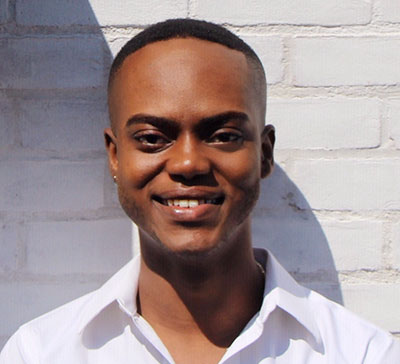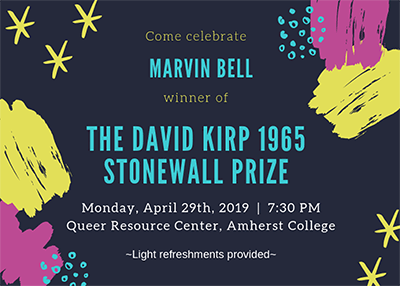
Faculty, staff and friends had gathered in the QRC to honor Bell as this year’s winner of the David Kirp ’65 Stonewall Prize, which is awarded for “a work of exceptional intellectual or artistic merit pertaining to the queer, bisexual, intersex, gay, lesbian or transgender experience.” Bell’s finished thesis project, titled “Forgotten, But Not Gone: The HIV/AIDS Epidemic in Jackson, Mississippi,” examined the socioeconomic and political systems that have left many of the city’s poor black residents especially susceptible to the disease. The ethnography presented the experiences of five of the men Bell interviewed, some of whom had been rejected from their biological families but could still find “meaning and love and joy,” he said—largely through the support of chosen queer family networks. “Contracting HIV/AIDS wasn’t the final chapter of their story,” said Bell, who went on to work for an HIV/AIDS nonprofit after graduating from Amherst in December.
The Stonewall Prize was established at the College in 1989, and named to commemorate a series of events that began exactly 50 years ago, in late June 1969: the Stonewall riots, in which patrons and neighbors of a Manhattan gay bar called the Stonewall Inn fought back against a police raid. The uprising is widely considered a watershed moment in the LGBTQ+ community’s national struggle for liberation, inspiring the founding of gay rights organizations, newspapers and Pride parades.
At Amherst, the Stonewall Prize came about thanks to advocacy by student members of the Friends of the Lesbian, Bisexual and Gay Alliance; the Department of Women’s and Gender Studies; and other faculty. The prize fund was formed with donations from Dr. Jack W. C. Hagstrom ’55, now professor emeritus of pathology at Columbia University, and David L. Kirp ’65, now Professor of the Graduate School at UC Berkeley’s Goldman School of Public Policy. A former newspaper editor and former Amherst trustee, Kirp has written extensively on education, affordable housing, gender discrimination, AIDS and other social issues. His name was added to the name of the prize last year, when he made an additional donation to support an annual celebration of the student winner(s) and/or publication or performance of the prizewinning project(s).

Polk especially appreciates that the Stonewall Prize has always been geared toward interdisciplinarity and projects that defy simple categorization. This goes to show, he said, that the award is “queer in its very makeup.”